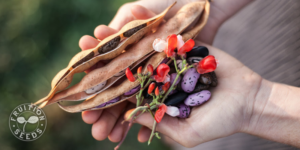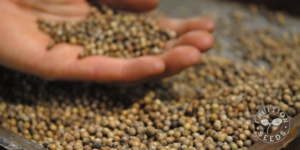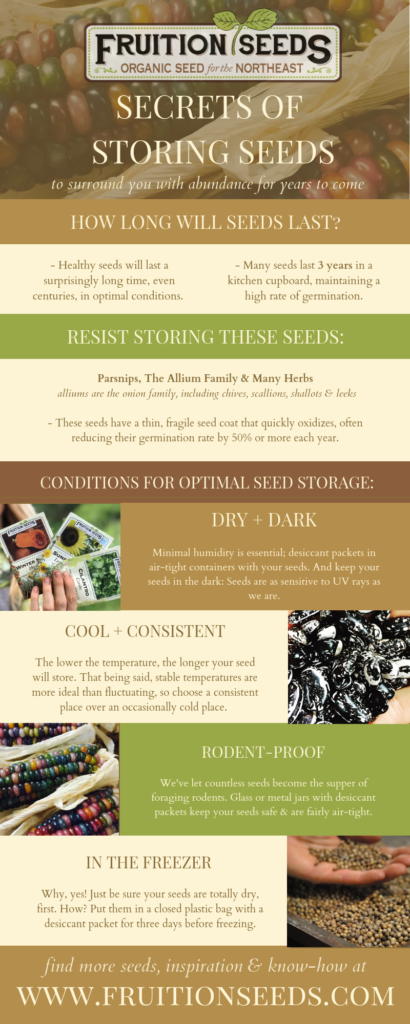How Long Do Seeds Last?
Fruition’s Seeds Storing Strategies
Whether you have a handful of your family’s heirloom beans or you simply wish to keep your germination rates high for next season, storing your seeds well puts your mind at ease and will surround you with abundance for years to come.

Beans, like the Chocolate Runners, are among the longest storing seeds, often sprouting after a century in ideal storage conditions.
Courtesy of Petra Page-Mann / Fruition Seeds
How Long Will Seeds Last?
Many seeds will maintain great germination for three years even in your kitchen cupboard, though there are exceptions. Stored well, some seeds can last centuries.
Conditions for Optimal Seed Storage
What conditions are needed for seeds to germinate? If you want seeds to store, give them the opposite conditions. Here are the four keys to keep your germination rates high for years to come:
– Dry
– Cool
– Rodent-Proof
– Dark
Keep Seeds Dry
Reducing humidity is key to storing seed, reducing risk of mold and pre-mature sprouting.
If you’re saving home-grown seed, I love you! And be sure it is very, very dry before you store it. At Fruition, we dry our seeds with fans constantly wicking moisture away. Your goal is about 7% moisture, but who can measure that? With large seeds, you can do the bend test. When you put bending pressure on your seed, does it bend or does it break? If it breaks, your seeds are dry enough to store. If they bend, leave the fan on and try again the next day. With small seeds, like tomatoes, we use two pairs of tweezers to do our bend tests.
Desiccant packets are ideal to keep in air-tight containers with your seeds. They’re commonly found in nori, vitamins, and shoes, though we share larger, more long-term packets that we use on the farm so you’ll have confidence in them for many seasons to come.
Keep Seeds Cool
The lower the temperature, the longer your seed will store. That being said, stable temperatures are more ideal than fluctuating, so choose a consistent place over an occasionally cold place. Think of bears, bats and other hibernating animals: Consistent winters, as long as they’re below a certain temperature, are easier to survive than winters that are cold with occasional temperature spikes.
In general, the north sides of buildings have more consistent temperatures than their southern sides, here in the northern hemisphere.
The 100 Rule
If the temperature plus humidity of a space equal less than 100, you have good storage conditions for your seeds. And of course, the lower the better. For example, our seed at Fruition is stored at 40 F and 30% humidity, totaling 70. Well less than 100, thank goodness! It’s hardly worth buying special equipment, but it’s a great rule to keep in mind.

Cilantro, like all seeds, stores longest in consistently cool conditions.
Courtesy of Petra Page-Mann / Fruition Seeds
Keep Seeds Away from Rodents
We’ve let countless seeds become the supper of foraging rodents. Glass or metal jars keep your seeds safe & keep them fairly air-tight, too. I prefer clear glass so I can peek at them, making sure they are mold-free. Tupperware is also an option, though I’ve definitely lost seed to brazen mice successfully gnawing the plastic.
Keep Seeds Dark
We’re sensitive to UV rays and seeds are, too! The darker you keep seeds, the longer they’ll store. Seriously, your kitchen cupboard is likely one of the best places to store your seeds.
Resist Saving These Seeds More than One Season
– All Alliums
– Parsnips
– Many Herbs
– Celery and Fennel sometimes, but not always
Though most seeds remain viable for years and often decades, the seeds of alliums (anything in the onion family, including shallots, leeks, chives, and scallion) and parsnip often lose their germination by 50% each year, regardless of conditions. Many herbs are also challenging to store. Their thin, fragile seed coat quickly oxidizes, causing them to lose germination fast. Store them as best you can and sow them more densely than you otherwise might in the seasons to come.

Freezing Seeds
If cold is good, freezing is great, right?
It is true that seed banks store their seeds frozen. Svalbard Global Seed Vault in Norway stores their seed at 0 F.
Freezing is a great way to store seeds for the long haul. If you’re planning on sowing them within a few years, it’s probably not going to make a huge difference, though it couldn’t hurt. Just be sure: Only freeze seeds that are completely dry.
When we freeze seeds, we tuck a desiccant packet in a closed plastic bag with the seeds for three days, letting the desiccant wick away any excess moisture. After the third day, we’re confident they’re fully dry and into the freezer they go.
The Best Place to Store Seeds in Your Home
Your kitchen cupboard probably wins. It’s dry, dark and though it’s not cold, it’s temperature is stable.
Your basement is a strong possibility, but only if it has low humidity.
Closets are generally dark, cool, low humidity with stable temperatures, as well.
Take a few minutes to evaluate the place you’re storing seeds.
May these tips surround you with even more abundance than you thought possible!

